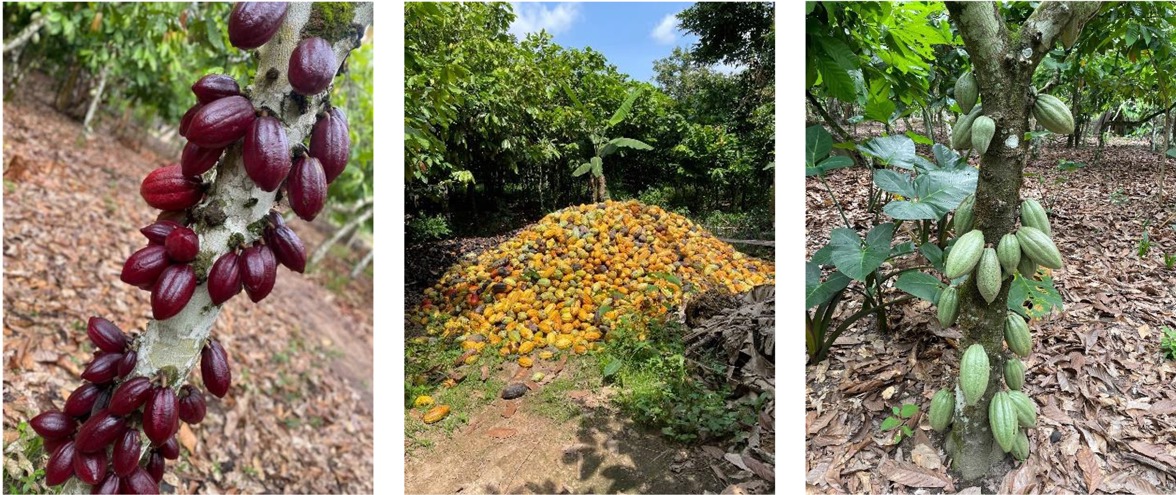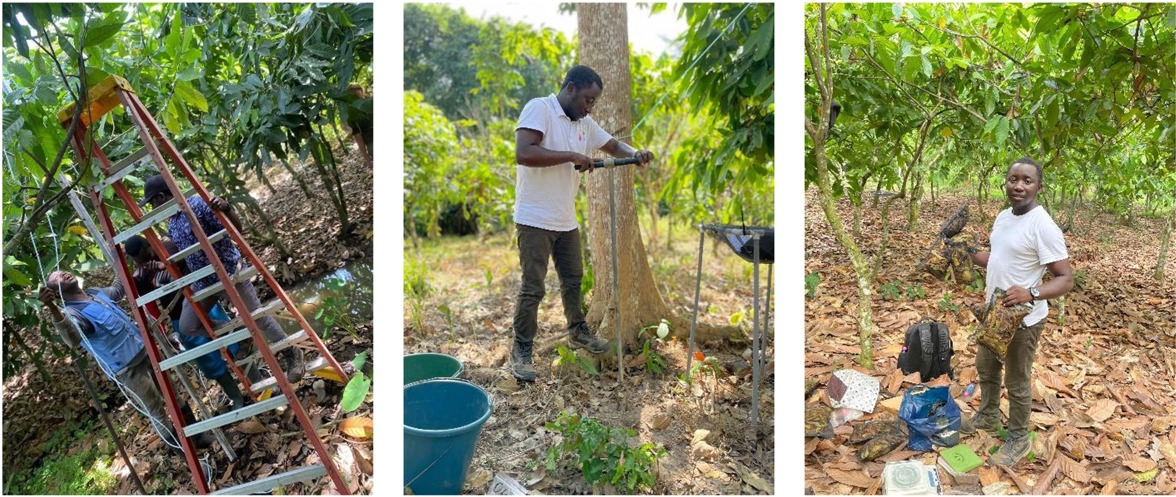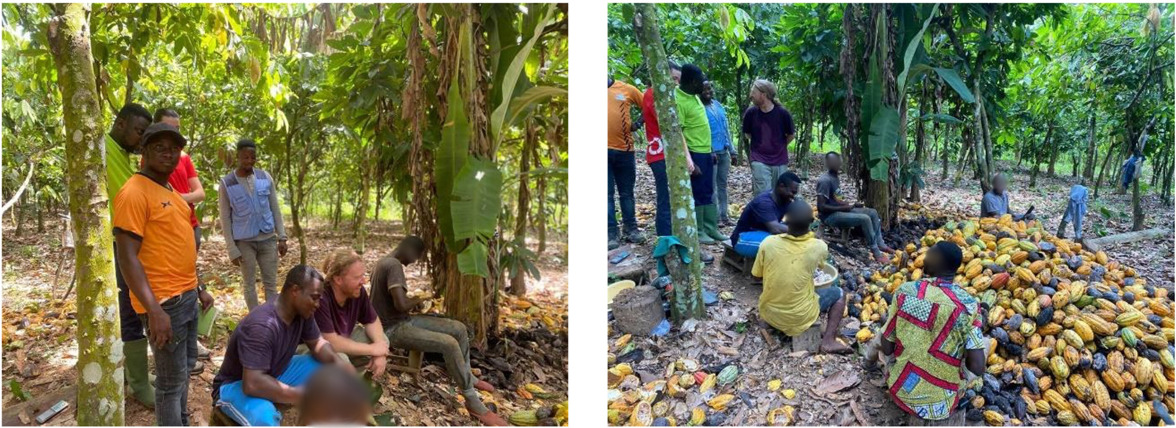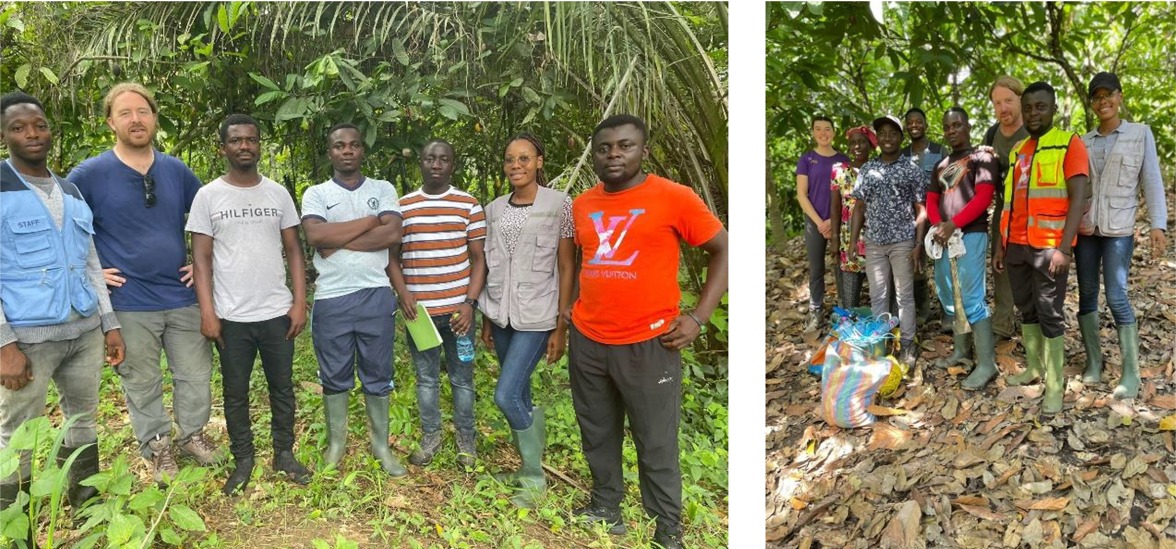Between 18th September and 24th November 2024, I undertook fieldwork in the Ashanti region of Ghana as part of my DPhil research. The primary purpose of this fieldwork was to collect comprehensive ecological data from cocoa farms to examine how specific characteristics of agroforestry systems influence microclimatic conditions, biodiversity, soil health, and cocoa sustainability. This data would contribute to understanding how sustainable practices can enhance productivity while maintaining ecological balance. The fieldwork was made possible through a Sir Peter Elworthy research grant award, which covered the cost of my return flight from London to Ghana, accommodation throughout the study period, and other associated expenses.
How agroforestry systems influence cocoa sustainability
Wednesday 05 March, 2025by Lubasi Limweta (Zambia & Linacre 2022)

The fieldwork spanned weekdays from Monday to Friday in the Konongo area. Each week, our activities were organized to maximize efficiency. On weekday mornings, the team departed from our base in Konongo to visit the designated cocoa farms. Upon arrival, we carried out various ecological assessments, which included installing microclimate sensor stations to monitor the microclimate parameters. Shade tree measurements were another critical component of our work. These involved identifying shade tree species, measuring their heights and canopy cover to assess the biodiversity and ecological role of shade trees in these agroforestry systems. Soil sampling was conducted at multiple depths to analyze nutrient availability and soil texture, which are crucial indicators of soil health. Additionally, we collected data on farm characteristics, including the size of the farms, and interviews with farmers.

After completing field activities during the day, the evenings were dedicated to organizing collected data and samples for transportation and storage. Fridays marked a transition as we travelled back to Kumasi to spend weekends at the Kwame Nkrumah University of Science and Technology (KNUST). These weekends were vital for transporting soil and plant samples, uploading the collected data, and to evaluate progress, strategize and sort the experimental materials to be transported for the following week’s fieldwork. This systematic approach ensured that every aspect of the research was well-planned and that no detail was overlooked.
The fieldwork was an enriching and transformative experience. Working directly with cocoa farmers allowed me to appreciate the complexities of their practices and the resourcefulness required to manage challenges such as pests, climate change, and fluctuating market demands. These interactions deepened my understanding of the human dimension of agroecology and underscored the importance of designing research that is both scientifically rigorous and practically relevant to farming communities.
The challenges I encountered, including weather disruptions and logistical difficulties accessing remote farms, provided valuable lessons in adaptability and problem-solving. I learned to be more flexible and proactive in managing fieldwork schedules, which is a crucial skill for field researchers. Additionally, this experience highlighted the importance of building trust and collaboration with local communities, as these relationships greatly facilitated data collection and the overall success of the project.

In addition to the study related experiences, I was able to learn the local culture and enjoyed the food. My usual breakfast was either Waakye, puff-puff (locally known in Ghana as bofrot) or sweet buns. Lunch was usually a plate of the amazing Jollof, Ampesie, red-red, fufu or banku with okro stew or Tilapia fish, and Thursday evenings were specifically reserved for Pizza and drinks.

The grant award played a crucial role in the success of this fieldwork. By covering the costs of my return flight from London to Ghana, it enabled me to travel to the field location and engage directly with the research environment. The funding also supported my accommodation for the entire duration of the fieldwork, providing a comfortable and secure base that allowed me to focus entirely on the research. Without this financial support, it would have been impossible to conduct such an extensive and meaningful field study. The grant did not only facilitate the research but also broadened my academic and professional horizons by allowing me to immerse myself in a real-world application of agroecological research.
In conclusion, the fieldwork conducted in Ghana was a productive and enlightening endeavour. It provided rich ecological data and invaluable insights into the interplay between cocoa agroforestry farming practices and ecological processes. The experience significantly enhanced my research skills and deepened my appreciation for the socio-ecological challenges faced by farmers. Moreover, it underscored the transformative impact of funding in enabling scholars to pursue meaningful research. As monthly data collection continues in the study sites for the next 12 months and the subsequent analysis of samples in the laboratory, findings from this fieldwork are expected to greatly contribute to the growing body of knowledge on sustainable agriculture and inform policies and practices in cocoa farming.
I would like to acknowledge that this work is part of The Flourishing Landscapes Programme (FLP) – one of the thirteen recipients of the first round of research grants awarded by the Global Centre on Biodiversity for Climate (GCBC) – funded by the UK’s Department for Environment, Food and Rural Affairs (DEFRA). I am deeply grateful to my research group at the Nature-based Solutions Initiative (NbSI) for their invaluable collaboration throughout this project. I would also like to extend sincere thanks to our partners at the Kwame Nkrumah University of Science and Technology (KNUST) for their essential contributions and ongoing partnership.


